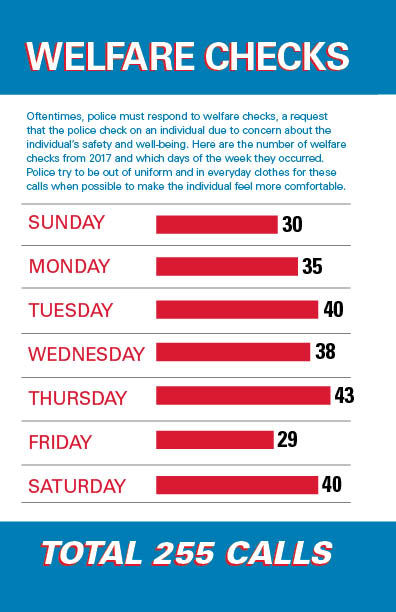- App Content
- App Content / News
- News
- News / Politics And Administration
- News / Politics And Administration / Campus
Police make promise to be of ‘one mind’ on mental health
March 5, 2018
Editor’s note: This story is part of a partnership publication between the Iowa State University Department of Public Safety and the Iowa State Daily to provide perspective about the status of safety on campus and the initiatives the department worked on in 2017.
An adorable husky puppy with a green bandana named Oliver was quite a hit on campus in October. But he was more than just a spectacle for those passing by.
Oliver wore the bandana as a part of ISU Police’s collaboration with Iowa State’s chapter of the National Alliance on Mental Illness (NAMI) for the “Bandana Project.”
The bandanas symbolize that you can approach that person about mental-health-related questions and resources.
The police have created a renewed focus on mental health issues under Chief Michael Newton’s leadership.
In Wisconsin, Newton was the board president of the National Alliance on Mental Illness (NAMI). Looking into NAMI Iowa, Newton makes mental health a priority. Newton serves as the adviser for Iowa State’s NAMI chapter.
“One of my other strong areas that I want to be involved in here is mental health. This is really important to me. Making sure that we have the right systems and processes in place to help students, faculty and staff with mental health concerns,” Newton said when he first started at Iowa State.
“Over the years, law enforcement has sort of ebbed. We used to have a lot of social service agencies and the social service agencies that would assist with mental health issues and concerns.”
Now, he feels that there has been an influx of mental health cases on college campuses causing more of a need. These cases have often ended in arrest in situations where Newton said mental health treatment would have been the better solution.
The training he would like to implement would deal with mental health, specifically teaching officers how to de-escalate.
“It also teaches that it’s the illness, not the person,” Newton said. “It helps them recognize that sometimes people who are in a mental health crisis act out and act differently.”
Parts of the training also help the officers think from the perspective of the person bearing a mental illness. This will lead to a better understanding of what it is like to have a disorder such as schizophrenia.
The agency launched the One Mind Campaign at Iowa State in October to be implemented in one to three years.
What
Iowa State’s One Mind Campaign is started by the International Association of Chiefs of Police.
Purpose
The campaign seeks to unite communities, public safety organizations and mental health organizations so the three become “of one mind.”
Four steps
- Establish a clearly defined and sustainable partnership with one or more community mental health organizations.
- Develop and implement a model policy addressing police response to persons affected by mental illness.
- Train and certify 100 percent of the agency’s sworn officers and selected civilian staff such as dispatchers in Mental Health First Aid for Public Safety.
- Provide Crisis Intervention Team training to a minimum of 20 percent of the agency’s sworn officers, and selected civilian staff such as dispatchers.
A note from Chief Newton
“Each and every time we provide services, we strive to treat people with respect, integrity and compassion. It does not matter whether the person is going through a mental health crisis, is suspected of committing a crime, or they are the victim of a crime. We need to approach people in a non-judgmental, non-confrontational way. Those who are suffering a mental health crisis are not always aware of their actions nor are they able to respond to traditional police techniques.
This campaign has the ability to help officers change their overall mindset on mental illness. The training involved will help officers understand the complexities of mental illness and will equip them with new tools that will help them help others. If we are going to be successful, we need a true partnership between police, community, mental health providers, the consumers and their families. Together we are stronger, and this program offers an opportunity to make mental health stronger at Iowa State University and the Ames community.”
















